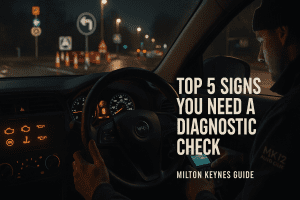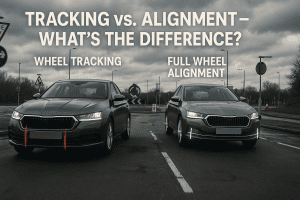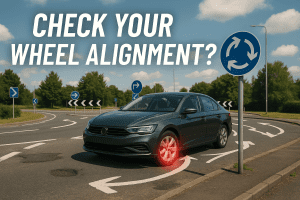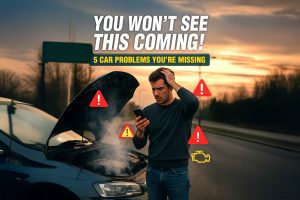That Moment When Your Brake Pedal Hits the Floor (And Your Heart Hits Your Throat)
Tap, tap… nothing.
Your foot presses the brake pedal, expecting that reassuring resistance, but instead, it sinks ominously toward the floor. The car ahead is getting closer. Your knuckles whiten on the steering wheel. Your heart pounds against your ribs.
Few things trigger pure panic like failing brakes. And yet, right now in Milton Keynes, hundreds of drivers are ignoring the warning signs that could put them in exactly this terrifying scenario.
“I was that driver,” admits Mark, a local IT manager. “Approaching the Kingston roundabout for my job interview, I pressed my brake and felt it sink almost to the floor. What followed was thirty seconds of pure terror swerving through traffic, frantically pumping the pedal, and praying I wouldn’t kill someone.”
The repair bill? £870. The missed interview opportunity? Priceless. The worst part? “The mechanic said I’d been driving with a slow brake fluid leak for weeks. If I’d brought it in when the pedal first started feeling soft, it would’ve been an £85 fix.”
Your car is talking to you every day. The question is: are you listening?
The 5 SOS Signals Your Brakes Send Before They Fail
Ever had that friend who drops increasingly obvious hints before finally exploding? Your brakes work the same way. Here are the desperate pleas they make before they quit on you completely:
1. The Banshee Wail: Screeching, Squealing or Grinding
That high-pitched squeal when you tap the brakes isn’t your car attempting to sing opera. It’s a deliberate design feature a metal wear indicator scraping against your rotor, screaming “REPLACE ME NOW!”
If you’ve been hitting mute on that sound for weeks and it’s evolved into a harsh metal-on-metal grinding? You’ve graduated from “needs attention” to “imminent disaster.” That grinding means your brake pads are completely gone, and your calipers are now chewing directly into your rotors.
Jenny from Bletchley discovered this expensive lesson: “I told myself the squealing was ‘just Milton Keynes dust’ for almost a month. When it became a horrible grinding noise, I figured I’d deal with it after payday. Two days later, my brakes failed completely on Midsummer Boulevard. My cheap £90 brake pad replacement turned into a £670 emergency repair.”
Pro tip: If your car makes a brief squealing noise that disappears after a few brake applications (especially in wet or humid weather), that’s often just surface rust and not a concern. But if that noise persists after a few stops? Get it checked immediately.
2. The Dashboard Christmas Tree: Warning Lights
We’ve all done it glanced at that illuminated brake warning light and thought: “It’s probably just being overly cautious.” Or worse: “Maybe if I ignore it long enough, it’ll go away.”
Let’s get real: that glowing symbol isn’t a suggestion – it’s your car’s computer detecting a potentially life-threatening issue. Modern vehicles have sophisticated sensors monitoring every aspect of your brake system. When they detect something wrong, they’re not crying wolf.
That little light could be alerting you to:
- Critically low brake fluid (the lifeblood of your stopping power)
- ABS system failure (crucial for stopping on our rain-soaked Milton Keynes roads)
- Dangerous pad wear beyond acceptable limits
- Pressure imbalances that could cause your vehicle to swerve during braking
As local driving instructor Raj puts it: “I tell all my students treat brake warning lights like you would chest pain. It might be nothing, but do you really want to take that chance?”
3. The Sinking Feeling: Soft, Spongy, or Low Brake Pedal
Your brake pedal should feel firm and responsive like pressing against a strong spring. If it feels soft, spongy, or sinks toward the floor with minimal resistance, your hydraulic braking system is waving red flags.
This symptom usually indicates one of several serious problems:
- Air bubbles in your brake lines (braking kryptonite)
- Fluid leaks in the master cylinder or brake lines
- Failing master cylinder (your braking system’s heart)
- Deteriorating flexible brake hoses
Each of these issues compromises the hydraulic pressure that makes your brakes work. And on Milton Keynes’ notorious grid system where you might need to drop from 70mph to a dead stop for a suddenly congested roundabout reduced stopping power isn’t just inconvenient, it’s potentially fatal.
“I should have known better,” admits Tom, a local delivery driver. “My brake pedal kept getting softer and lower for about two weeks. Then one morning on the school run, it went straight to the floor at the Denbigh roundabout. With my kids in the back. We missed three cars by inches before rolling into a curb.”
4. The Drift: Car Pulling to One Side When Braking
Your car should track straight as an arrow when you brake. If it yanks to one side like it’s being magnetically pulled, something’s seriously wrong with your braking system.
This frightening symptom typically means:
- A stuck or seized caliper (essentially a partially applied brake)
- Collapsed brake hose restricting fluid movement
- Contaminated brake fluid causing uneven braking force
- Significantly uneven brake pad wear
The real danger? It’s not just about extended stopping distances. That unexpected swerve can pull you into oncoming traffic, off the road, or into obstacles especially dangerous on Milton Keynes’ high-speed grid roads with their deep verges and concrete barriers.
When local nurse Priya experienced this, she didn’t wait: “My car started pulling slightly left during braking. Rather than ignore it, I took it straight to the garage. Turned out my left front caliper was seizing. The mechanic said if I’d driven another week, it would have completely locked up likely during braking. On these roads, with all our roundabouts, that could have been catastrophic.”
5. The Earthquake: Vibrating Steering Wheel or Pedal
If your steering wheel shudders like you’re driving over rumble strips every time you press the brake, your rotors are warped or damaged.
Those rotors the large, smooth metal discs behind your wheels should be perfectly flat. When they warp from heat (very common in Milton Keynes stop-start roundabout traffic) or wear unevenly, they create vibrations as your brake pads grab their irregular surface.
The consequences go beyond annoying vibrations. Warped rotors:
- Significantly reduce your braking efficiency
- Increase stopping distances (deadly on wet roads)
- Accelerate wear on other components
- Can cause brake fade during repeated heavy braking
“The shaking was subtle at first,” recalls Sam, who delivers packages around Milton Keynes. “By the time I got it checked, my rotors looked like rippled potato chips. The mechanic said I was gambling with my life every time I approached one of MK’s roundabouts.”
Why Milton Keynes Destroys Brakes (It’s Not Just You)
If you’re going through brakes faster than you think you should, you’re not imagining things. Our city’s unique design creates a perfect storm for brake wear:
- Roundabout Hell: With 130+ roundabouts, we apply and release our brakes more in one commute than many UK drivers do all day. Each approach means heavy braking, followed by acceleration repeated dozens of times daily.
- Heat Death: Brakes work through friction, which creates heat. They need cooling time between applications. Our grid system’s stop-start pattern means your brakes rarely get that crucial cooling period, especially in rush hour.
- Speed Massacre: Transitioning from 70mph grid roads to complete roundabout stops generates enormous heat in your braking system. This thermal stress is like repeatedly heating and cooling metal – eventually, something warps or cracks.
- Weather Warfare: Milton Keynes’ frequent rain creates slippery roads requiring harder braking, while winter road salt accelerates corrosion of metal brake components.
Dave Williams, head mechanic at MK12 Autocare, sees this daily: “We replace brake components about 25-30% more frequently here than the national average. It’s not driver error it’s the reality of navigating Milton Keynes’ unique road network. I tell customers to think of brake checks like dentist visits – prevention is always cheaper than the cure.”
The True Cost of Ignoring Brake Warning Signs
Sarah’s story is a cautionary tale all Milton Keynes drivers should hear.
“That squealing noise started just after Christmas. With holiday bills to pay, I convinced myself it could wait until February,” she explains. “Three weeks later, my brakes failed completely approaching the Westcroft roundabout. I rear-ended another car at about 15mph.”
The final tally?
- £1,800 in complete brake system repairs
- £900 insurance excess for the accident
- 30% insurance premium hike for THREE YEARS (costing an additional £900+)
- Two weeks without her car
- The guilt of knowing she’d put others at risk
“For the want of a £120 brake pad replacement, I ended up over £3,600 out of pocket,” Sarah admits. “And that doesn’t count the sleepless nights worrying about what could have happened if I’d been going faster.”
Contrast this with Mike’s approach:
“My brake pedal felt slightly different one Monday morning just a bit softer than normal. Instead of waiting, I drove straight to MK12 Autocare that afternoon,” he says. “They found a small leak in one brake line – a £160 repair including labor. According to them, within days it would have led to complete brake failure.”
When You Notice These Warning Signs (Your Emergency Action Plan)
If you’ve spotted any of these warning signs, here’s what to do:
- Don’t Just Turn Up the Radio – That squealing won’t go away by drowning it out. It’s your final warning before costlier damage.
- Adjust Your Driving Until Repaired – Double your following distance, reduce speed, and take extra care at roundabouts.
- Get a Professional Assessment ASAP – Brake issues aren’t DIY territory. The safety risk is too high.
- Ask About Preventative Maintenance – Once fixed, get on a regular inspection schedule to catch issues early.
- Remember What’s at Stake – It’s not just about repair costs; it’s about preventing the unthinkable.
MK12 Autocare: Your Brake Specialists Who Understand Milton Keynes Driving
At MK12 Autocare, we’ve seen firsthand how Milton Keynes’ unique road system punishes braking systems. Our technicians are specifically trained to spot the early warning signs of brake failure before they leave you stranded (or worse) at one of our many roundabouts.
We offer:
- Free brake safety inspections – no obligation
- Clear, jargon-free explanations of any issues found
- Transparent fixed pricing with no hidden costs
- Genuine or OEM-quality parts only
- Same-day brake repairs for many common issues
Don’t wait for that terrifying moment when your pedal sinks to the floor. At the first hint of any warning sign, book your brake inspection online
Because in Milton Keynes, with a roundabout always just ahead, your brakes aren’t just components they’re your lifeline.
Have you experienced a brake failure or close call in Milton Keynes? Share your story in the comments to help others recognize the warning signs.






